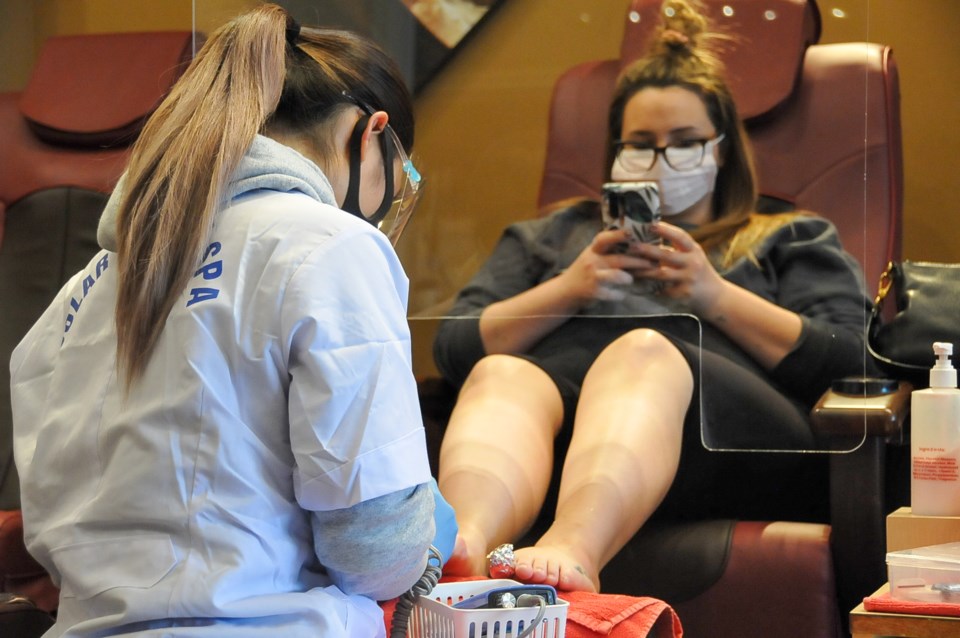Several Port Coquitlam retailers are calling out their landlord for denying them access to an emergency government program that helps businesses cover rent.
From a nail salon to a coffee shop and a shoe store, the coronavirus brought commerce to a standstill for a collection of small businesses in the strip mall on the southeast corner of Westwood Street and Lougheed Highway.
Helmi Georgey, who operates the Waves Coffee House at the plaza with his wife and son, was forced to lay off four workers after he shut his doors March 18. Looking back at his books, his revenue plummeted by over 90% in April and to roughly 70% in May. With a monthly lease of $9,500 — his biggest cost — there was no way he could cover his expenses.
So, like a dozen of the small businesses in the plaza, he worked out a deal with the landlord to defer half of April and May’s lease payments. Those deferrals totalled $120,000, a cost borne entirely by the landlord after the lender declined to provide any assistance, according to Chris Andison, CEO of the property management company Value Property Group, which oversees the plaza and neighbouring Westwood Mall.
But while in an email to the Tri-City News the landlord said it was forced to pass on the costs to tenants so it could meet its lending obligations, for Georgey, that means paying an extra $1,700-plus a month on his lease from July to December — an added cost at a desperate time.
Then came the announcement of Ottawa’s Canada Emergency Commercial Rent Assistance (CECRA) program, and hope swelled among small business owners that they’d have enough relief to stay afloat.
Under the CECRA program, the federal government is offering to cover 50% of commercial leases for businesses which have suffered at least a 70% decline in revenue. Businesses and their landlords split the remainder, each covering 25% so that the landlord is guaranteed to receive 75% of their lease.
But enrolment must be initiated by the landlord, and for small business owners like Georgey, their landlord’s refusal to participate could cost them their business as they struggle to come out from under the financial fallout of the COVID-19 pandemic.
More than a place to get a cup of coffee, Georgey says his café is gathering place for people in the community to safely test the post-COVID waters of the province’s phased re-opening.
With a meeting area in the back and enough space to offer a wide berth and still accommodate the 50% capacity mandated by the province, the cafe acts as a community hub, hosting knitting and writing groups, painting classes, seniors outings, studying students, hustling freelancers and even business groups.
“We have good relations with everybody,” he said. “You sit, you look, you feel like you’re at home. It’s a safe space to come.”
“But if the landlord doesn’t submit [the application for rent relief], business doesn’t pick up, I give the key to the franchise,” said Georgey, dusting off his hands. “Thank you very much.”

Next door to Waves, Kelly Nguyen has been running Solar Nail and Spa for the past 15 years. She too shut her doors in mid-March. Last week, their first one back, was totally booked, with clients looking to pamper themselves after months of self-isolation.
But many clients are still scared to go out, according to Kelly and her sister, Linh Nguyen, who runs her own salon off Como Lake Avenue.
With zero revenue coming in over the 10 weeks leading up to June 1, and the cost of re-opening complicated by a doubling in the cost of supplies — from alcohol to gloves and masks — access to the federal lease subsidy could mean life and death for the salon.
“It’s day-by-day,” said Kelly, translated by her sister. “I don’t know what I can do now.”
Still, Linh said her sister’s path out of the COVID-19 crisis has been fraught compared with hers. Linh’s landlord off Como Lake Avenue initially offered to eat the cost of her lease to help her survive the shutdown and ultimately signed up to Ottawa’s rent assistance program.
“You can’t have it fall onto only one person or only the government,” said Linh, referring to shared costs of CECRA. “I was just happy that [my landlords] were so kind and caring at a time when we needed it the most.”
But for Kelly, it’s not so simple, as her salon’s lease expires in September, and with bookings down, she doesn’t know if she’ll be able to upkeep the $6,300 lease.
CASH FLOW
On the other side of the plaza, Foot Solutions operates as the only specialty orthopaedics retailer in the Tri-Cities, according to owner-operator Voytek Krawus.
Krawus laid off one worker and moved all his sales online for about 10 weeks during the height of the closure. Still, revenue plummeted by well over 70% compared to last year, he said.
“Whatever I make in a month, I have to pay all the expenses,” said Krawus. “Not having anything from the three months, I cannot pay suddenly the full amount of the lease, plus the first part of the deferral… It’s not possible.”
Krawus said he’s been trying to work out a solution with the landlord, from another deferral to the government rent program, both of which he said were denied by the property managers.
Value Property Group would not disclose the identity of the landlord they represent. But in correspondence sent from the company’s senior legal council, the landlord lays out why they won’t apply for the commercial rent subsidy, citing at least 16 reasons the program is both “onerous and unreasonable” and that it transfers “all the risk and expense from the government to landlords.”

The latest correspondence Krawus received from the property managers was a message saying he was in default of the lease agreement.
If it weren’t for a provincial order last week that prevents landlords from evicting tenants until the end of June — a window meant to give all parties a chance to enrol in the federal rent program — Krawus said he’d be evicted.
Still, Krawus, like many of the business owners in the plaza, fault the federal government for putting the power into the hands of landlords.
It’s the one point where the landlord and the tenants appear to agree.
All the risk falls on the landlord should tenants default on their obligations, wrote Value Property’s Andison, describing the CECRA program as “a myriad of unnecessary layers, putting the landlord between the government and the tenant who needs relief.”
Andison said the landlord has advocated for a rent relief program that closely models the province’s residential rent relief program, in which the tenant can make a direct application.
But with the clock ticking on the CECRA program (applications must be submitted by the end of August), small business owners like Krawus say they’re left with few options beyond taking out more loans and going further into debt.
“Any business in this scenario over the last three months — if you guaranteed 75% of the income, they would take it with their eyes closed,” said Krawus.
“They want us all evicted? The whole plaza? Give me 75% monthly and I’ll take it. Why not them?”
— with files from Haley Woodin
CORRECTION: An earlier version of this story stated the deadline for applications to the CECRA program was June 31. The deadline, in fact, is August 31.



